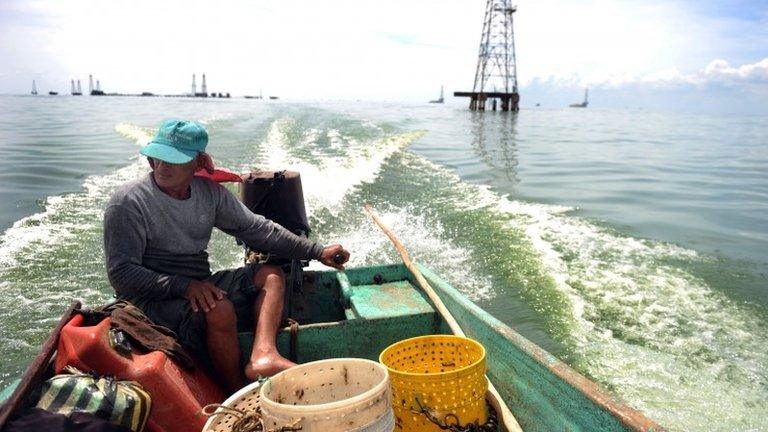Why Venezuelans worry more about food than crime
- Published
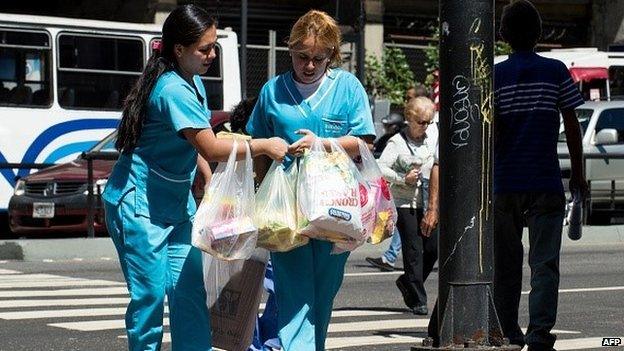
Food shortages have become an "obsession" for some in Venezuela
Marta doesn't need to go shopping today, because her fridge is filled with all the products her family requires.
But when she walks down through the jagged stairs of the Petare slum in Caracas, she meticulously scans the different supermarkets and pharmacies where she may be able to buy one of the price-controlled products that are so scarce in Venezuela these days.
Finding basic products has become a reason for Marta to get out of bed in the morning. "It's become like an obsession," she says.
In 2003, then-President Hugo Chavez introduced price controls for some 40 food and hygiene products to guarantee the poor had access to staple goods.
But lately, in the midst of a cash crisis, price controls seem to have become a headache.
For the first time in years, shortages and inflation have replaced security as the biggest worry for Venezuelans, according to a recent poll by Caracas-based Datanalisis.
It is a surprising statistic for one of the most violent countries on earth.
But necessity is not the reason why Marta shops - it's opportunity.
"The other day I bought olive oil without knowing what it works for because people were buying it like crazy as it was supposed to be cheap," she says.
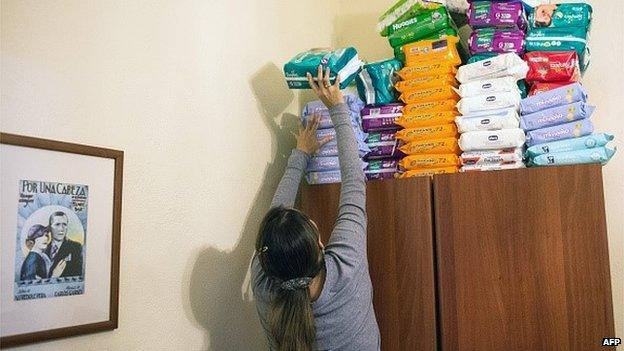
Consumers have been stocking up on basic goods
Smugglers and hoarders
After the global drop in the price of oil, Venezuela's biggest source of revenue, shortages in the South American country went from bad to worse.
Datanalisis says every week, on average, Venezuelans go to four different supermarkets and spend around five hours looking for goods.
President Nicolas Maduro says shortages are caused by US-backed, far-right groups who smuggle and hoard products in an economic war to destabilise his socialist government.
"Venezuela currently has the necessary goods to feed the people, but there is a problem with distribution," says Eduardo Saman, a former commerce minister in the government of the late Hugo Chavez.
"And distribution is in the hands of companies who operate as a cartel and seek to affect the government," he tells the BBC.
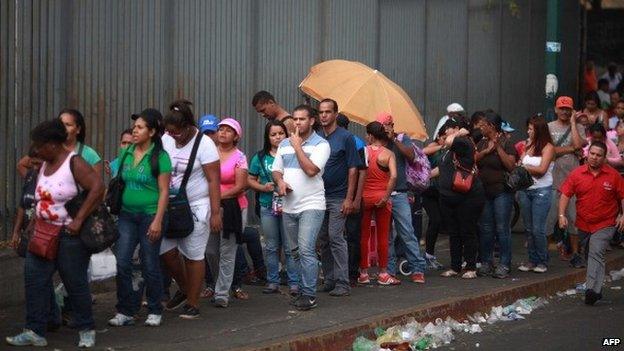
Queues frequently form outside supermarkets
Yet government critics don't believe that this sort of conspiracy is the source of scarcity.
"When you impose prices that are below the value set by supply and demand, you will have an oversubscription and a drop in supply, here or anywhere in the world," says Angel Alayon, an economist who has written several papers on scarcity for the ideas website Prodavinci.
"I don't doubt there is hoarding and smuggling, but these are consequences of scarcity, not causes," he tells the BBC.

Venezuela's economy:
Heavily dependent on oil - 96% of its export revenues are reported to come from the commodity
Socialist economic reforms, brought in by former President Hugo Chavez and continued by Nicolas Maduro include nationalising much of the economy, especially the oil sector, and expanding social programmes to help the poor benefit from the country's oil export revenues
Hit by political instability and falling oil prices, the economy fell into recession in 2014
Inflation hit 68.5% at the end of last year

Crime wave
Partly thanks to price controls, the government has more than halved the malnutrition rates the country recorded 20 years ago, a policy that has been celebrated by international organisations such as the UN.
But with the highest inflation rate in the world - 68.5% in December - Mr Alayon says producers can barely cover their costs.
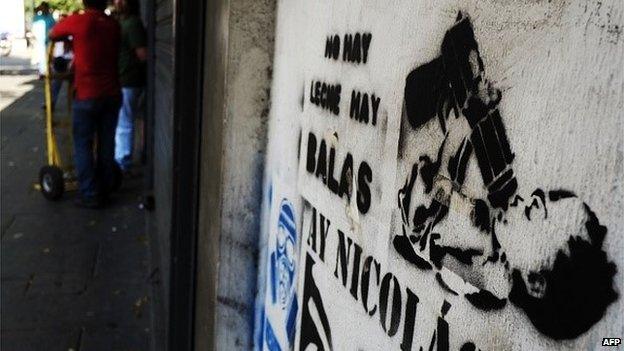
Stencilled on a wall in Caracas: "There's no milk, there are bullets"
The Venezuelan economy shrank throughout last year, hit by falling oil prices. And as the country has fallen into recession, crime has boomed.
The government has not made national homicide rates public in more than a year, but independent organisations such as the Venezuelan Observatory of Violence say the rates are increasing.
The NGO's annual report for 2014 recorded 24,980 violent deaths - equating to 82 murders per 100,000 inhabitants, up from 79 in 2013.
Those are figures for a country at war.
Even the police have become victims of crime, as 268 policemen were killed in the country in 2014.
A recent poll by the Observatory on Organised Crime reported that 51% of Venezuelans say murders had taken place near where they lived, external.
Psychology
"As insecurity is not solved - and far from it, it only gets worse - people had got used to the problem as part of their life without any hope of a real solution nor genuine offers from politicians," says Luis Vicente Leon, chief executive of Datanalisis.
"Since people have got used to insecurity, new problems that get worse like shortages or inflation tend to be more mentioned as their main concern."
But there might also be a psychological reason why shortages have become such an "obsession" for Venezuelans.
"Overall, at the precise moment when you stop finding a product, it becomes more precious than it used to be," says American psychologist Eldar Shafir, co-author of Scarcity: Why Having Too Little Means So Much.
"Think of it as a work of art that was stolen and when it is found the price is three times higher.
"When you're not able to get something, it becomes a challenge that captures your attention, to the point of getting obsessed with it and sacrificing other things that are on the periphery, such as exercising or playing with your children."
- Published9 September 2024
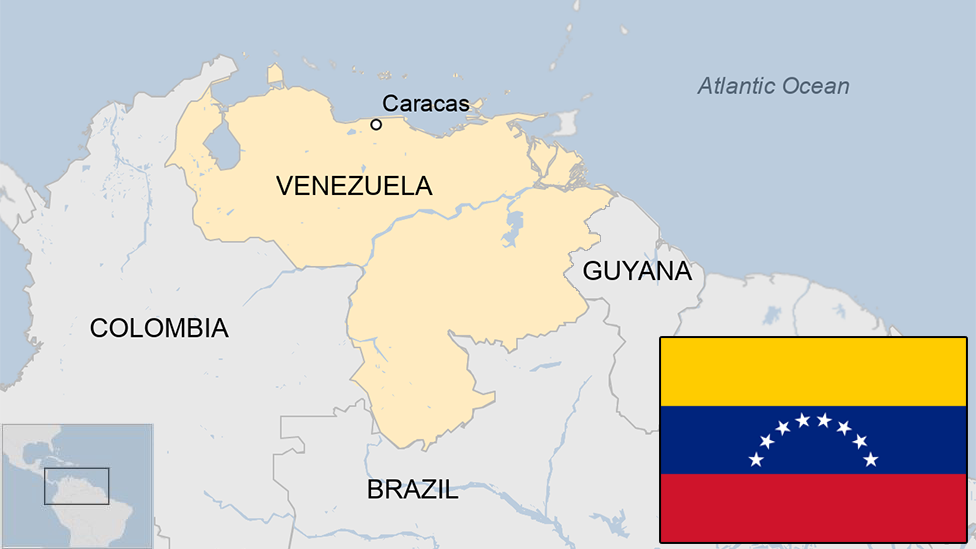
- Published29 April 2015
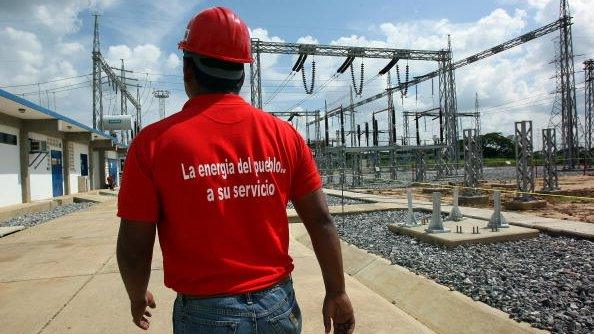
- Published31 December 2014
